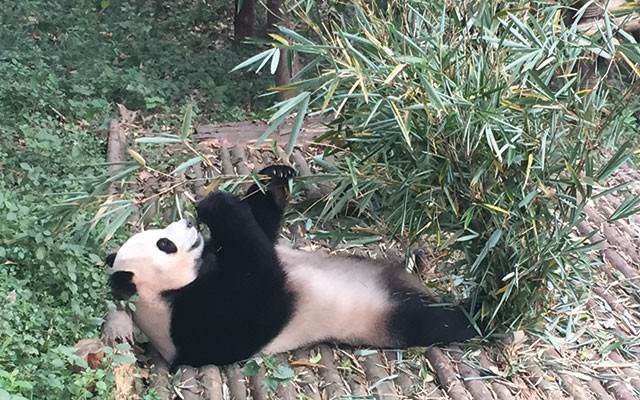Tour guide Mavis Mei loves pandas. As she leads our bus tour from Chengdu, China to the Chengdu Panda Research Base outside town, she recounts the history of her favourite animal. Westerners have only known about giant pandas since the 1800s, but they've been around for more than two million years. "We call the panda a living fossil," she says.
Pandas are revered in China. But like the country, the animal has gone through hard times. Nineteenth century China faced poverty, famine, corruption and fighting. Panda hunters got a high price for their skins. Mei says sadly, "We could not even protect ourselves. How could we protect the pandas?"
Panda hunting was banned in 1949. In 1984, a massive bamboo die-out caused the demise of 184 pandas. The Chinese government and the international community of panda lovers intervened. People from all over the world sent money to ship bamboo to pandas. Mei reverently recalls that a friend who was seven years old at the time broke her piggy bank and donated all her money for panda food.
To prevent future panda hardship, the Chinese government opened the country's panda bases.
At the Research Base
Jostling for a spot among the sea of selfie sticks, trying to reach the front row, I feel like I'm at a rock concert. But everyone is angling for the best view of three roly-poly, six-month-old panda cubs. They wrestle and chomp bamboo, oblivious to being memorialized in a gazillion digital photos.
The Chengdu Panda Research Base opened in 1987 with only six pandas. Today about 40 pandas reside there. China now has thirty-two panda bases, but this is the only one open to the public. Visiting is like going to a zoo that features only giant pandas and red pandas — which, despite the name, aren't related. There's also a visitor centre, museum, nursery, research facilities, movie theatre and, of course, a gift shop.
The best time to visit is early in the morning, when pandas are most active. Fortunately, they were still lively when we arrived around 9:30 a.m. Aside from wrestling and climbing trees, pandas mostly eat. Since their main food is bamboo, which isn't very nutritious, they conserve their energy by sleeping a lot. Pandas are known as vegetarians, but they retain the digestive tracts of the carnivores they once were. And they still indulge in an occasional bamboo rat.
A 20-minute film with English subtitles allows visitors the chance to see video of newborn pandas, pink and furless, weighing only about 100 grams. In the wild, a panda mom gives birth to twins about 50 per cent of the time. She picks the healthier twin and lets the other die. But with the resources of the research base, panda babies have nearly a 100-per-cent survival rate.
During the film, the 99-per-cent Chinese crowd shows its panda pride. They laugh at images of pandas bathing, somersaulting and drooling on themselves. As an American, I envy them having such a cute national animal. Bald eagles are majestic and brave, but not huggable. China has us beat a million times over with the cuteness factor.
Pandas Make Everything Better
The cuteness factor is not lost on marketers. In Sichuan province, panda merchandise is everywhere: hats, sweatshirts, backpacks, chopstick holders and even plush panda numchucks. At the upscale shopping mall on Chengdu's Chunxi Road, the Hipanda store sells jackets and T-shirts with pissed off looking pandas, proving that even angry pandas are cute. The local philosophy is that pandas make everything better. On the highway outside Chengdu, I even saw a cartoon panda cheering up a billboard for the Sichuan Anorectal Hospital.
Future Panda
Thanks to conservation efforts, in September 2016 the World Wildlife Fund downgraded pandas' status from "endangered" to "vulnerable." China's panda bases have been crucial to this improved status. The Chengdu base's original six sick-and-starving giant pandas have generated 167 babies, including 23 born in 2016.
The Chengdu base captures and nurses sick wild giant pandas back to health. Several have become well enough to release back into the wild. The base has established a giant panda sperm bank for conservation and genetic diversity of pandas.
It's a grim time for many species around the world. As Mei tells my tour group, there's a Chinese saying about conservation: "The last pure water on the earth will be human tears." Let's hope that efforts like the Chengdu Panda Research Base continue to put a happier face on the future of conservation.




